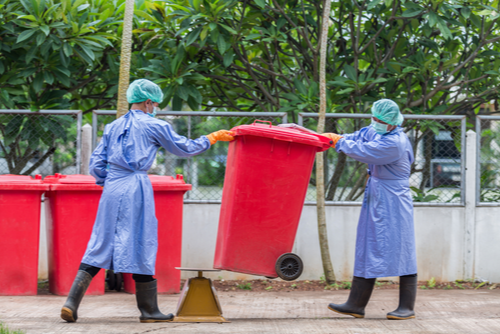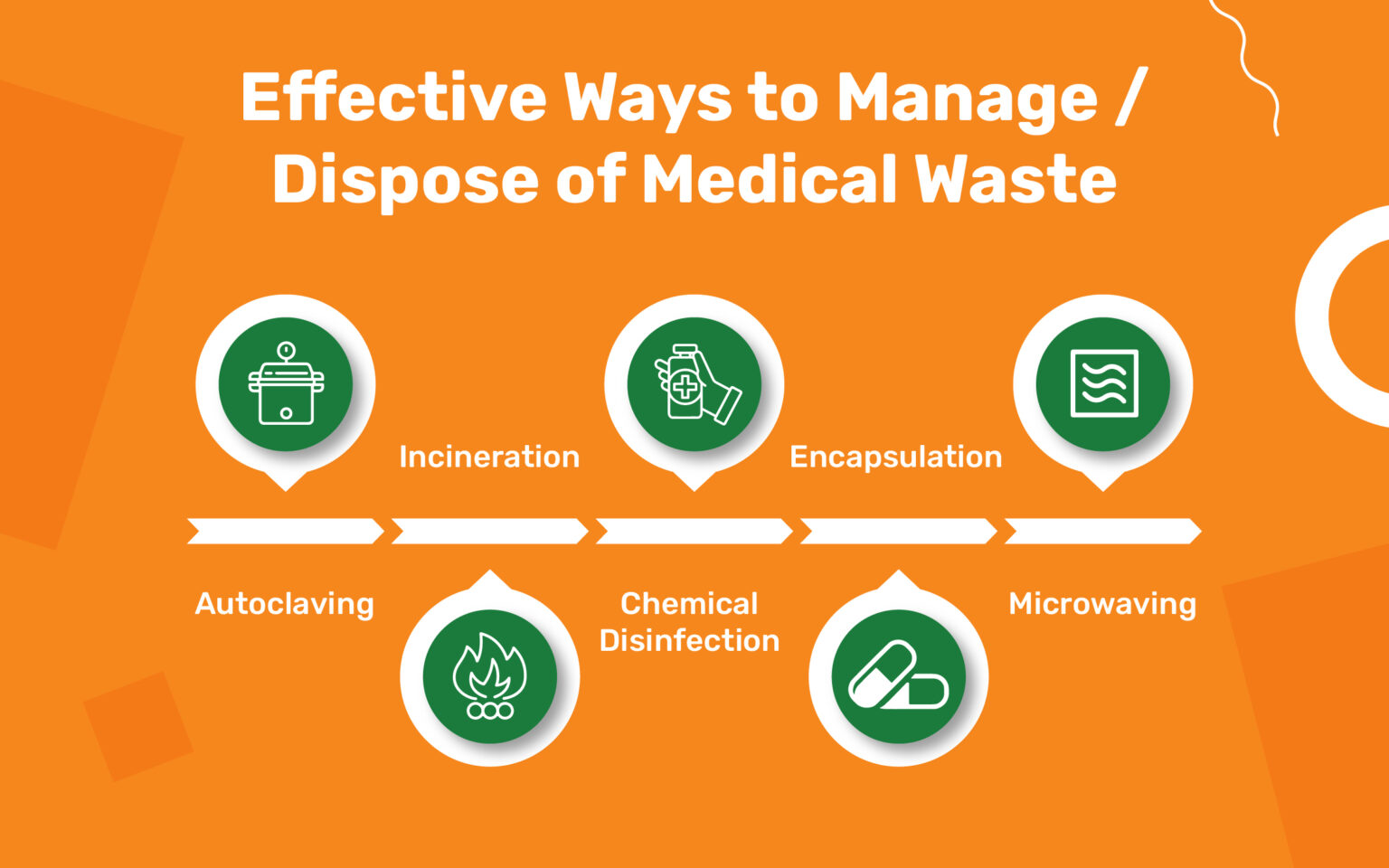Stay Ahead of Laws: Professional Suggestions on Medical Garbage Disposal
In a world where the healthcare sector is regularly progressing, it is necessary for medical facilities to remain ahead of regulations when it comes to the correct disposal of medical waste. From understanding the various classifications of clinical waste to carrying out the best collection and segregation approaches, this discussion will certainly supply workable ideas and important understandings to assist facilities stay in advance of guidelines in the ever-changing landscape of clinical waste disposal.
Comprehending Medical Waste Categories
Comprehending medical waste classifications is important for appropriate disposal and administration in health care facilities. Clinical waste refers to any type of waste generated by health care tasks that may posture a risk to public wellness or the environment. It is critical to categorize clinical waste properly to ensure its risk-free handling, therapy, disposal, and transport.
There are a number of groups of medical waste that health care centers need to be acquainted with. One of the most usual categories include contagious waste, pathological waste, sharps waste, pharmaceutical waste, and chemical waste. Each group has specific guidelines and guidelines for its correct management and disposal.
Infectious waste includes materials polluted with blood or various other physical liquids, such as handwear covers, dress, and laboratory cultures. Pathological waste refers to human tissues, organs, or body parts that need special delivery and disposal. Sharps waste consists of made use of needles, syringes, and various other sharp things that can create injury and transmit infections. Drug waste comprises expired, unused, or polluted medications that require careful handling and disposal. Lastly, chemical waste includes solvents, disinfectants, and other chemical compounds utilized in medical care centers.
Staying Up-To-Date With Regulatory Adjustments
Remaining present with regulative changes is vital for medical care centers to make sure compliance and proper management of clinical waste disposal. medical waste removal service. With policies continuously progressing, it is crucial for health care centers to remain up-to-date to stay clear of fines, fines, and potential injury to the atmosphere and public health
To remain ahead of regulatory adjustments, health care facilities must establish a system for surveillance and tracking updates. This can be done by subscribing to governing newsletters, participating in workshops and conferences, and proactively joining sector associations. Additionally, centers ought to mark a personnel or group accountable for remaining notified and sharing information to pertinent stakeholders.
Regular interaction with regulatory companies is additionally crucial. Healthcare centers need to establish relationships with regional, state, and government agencies to guarantee they understand any type of changes in guidelines that might impact their waste monitoring techniques. This can be done via regular meetings, engagement in public remark periods, and positive engagement with regulative firms.
Furthermore, medical care facilities need to think about partnering with waste management firms that focus on clinical waste disposal (medical waste disposal services with WasteX). These business are often skilled in the most up to date regulations and can supply advice and assistance to ensure compliance
Implementing Appropriate Collection and Partition Techniques
To properly take care of clinical garbage disposal, healthcare facilities must establish proper collection and segregation methods according to governing standards. Applying these approaches makes certain the secure handling and disposal of possibly unsafe products, secures the atmosphere, and lessens the danger of infections and injuries to healthcare workers and the public.
Proper collection and segregation approaches entail the use of assigned containers and identifying systems. Health care facilities need to give plainly identified containers for different sorts of clinical waste, such as sharps, contagious waste, pharmaceutical waste, and non-hazardous waste. These containers ought to be color-coded and plainly significant to prevent complication and advertise very easy recognition.
Furthermore, health care facilities should educate their personnel on the correct treatments for gathering and segregating medical waste. This find this consists of educating them on the various sorts of waste, the appropriate containers to make use of, and the relevance of complying with guidelines and guidelines. Routine training sessions and refresher training courses ought to be performed to make sure that staff participants remain updated on best methods.
Additionally, medical care facilities need to establish a system for normal collection and disposal of medical waste. This might involve partnering with certified waste monitoring companies that concentrate on clinical waste disposal. These business will make sure that the collected waste is moved and taken care of in compliance with governing requirements.
Selecting the Right Disposal Approaches

Incineration is just one of one of the most usual and reliable methods for dealing with specific kinds of medical waste, such as pathological waste and sharps. It includes the controlled combustion of waste at heats, decreasing it to ash. Incineration can launch harmful pollutants right into the air and add to air contamination.

Chemical treatment involves the use of chemicals to counteract the waste and decontaminate. Microwave therapy makes use of microwave power to warmth and decontaminate the waste.
Ensuring Compliance Through Documentation and Training
After carefully considering the suitable disposal methods for medical waste, healthcare centers have to make sure conformity with medical waste disposal services with WasteX guidelines and lessen environmental impact by executing effective documentation and training treatments. This action is vital in preserving a sustainable and secure atmosphere for both health care workers and the public.

Training is equally crucial in making certain compliance with guidelines. Medical care workers who manage clinical waste should receive proper training on waste partition, handling, and disposal procedures. This training should cover topics such as the appropriate use individual safety equipment, identification of different sorts of waste, and the right disposal approaches for each and every waste category. By providing extensive training, health care centers can equip their team to make enlightened choices and decrease the threat of inappropriate garbage disposal.
Verdict
Finally, remaining in advance of guidelines in medical waste disposal is essential for healthcare facilities. medical waste removal service. Understanding the different groups of clinical waste, staying upgraded with governing modifications, executing proper collection and partition techniques, choosing the appropriate disposal approaches, and making sure compliance via paperwork and training are all important steps. By adhering to these guidelines, medical care companies can efficiently dispose and handle of medical waste in a secure and accountable manner
From recognizing the different groups of medical waste to applying the ideal collection and segregation approaches, this discussion will certainly supply valuable understandings and actionable ideas to help centers stay ahead of laws in the ever-changing landscape of medical waste disposal. - medical waste disposal services with WasteX
The most usual categories include infectious waste, pathological waste, sharps waste, pharmaceutical waste, and chemical waste. Medical care facilities must supply plainly classified containers for various kinds of clinical waste, such as sharps, transmittable waste, pharmaceutical waste, and non-hazardous waste. Healthcare facilities should establish an extensive system to tape-record and track all elements of medical waste disposal, including types of waste generated, quantities, and disposal methods used. Healthcare employees that take care of clinical waste must get proper training on waste partition, managing, and disposal procedures.